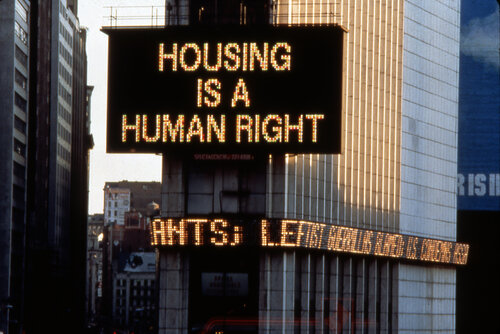
Martha Rosler, Housing Is a Human Right, short animation produced by The Public Art Fund, “Messages to the Public,” 1989
What exactly is affordable housing? There’s much discussion these days, and finally, concerning an affordable housing crisis, the lack of affordable housing, the vast and growing numbers of households, families, individuals and communities living and struggling with housing insecurity, paying more than 30% of monthly income on household expenses and/or expecting to be evicted or foreclosed on within the next two months. So, what does affordability actually mean? This question came roaring to the surface in a new study, Eviction in Oregon’s Subsidized Affordable Housing, which looked at eviction filings and evictions from January 2019 to December 2023. On one hand, eviction filings against residents of subsidized affordable housing made up a relatively small fraction of all eviction filings in Oregon. However, once the eviction case was filed, subsidized tenants were more likely to get an eviction judgment. The vast majority of these filings were for non-payment. The vast majority of non- or late payment was because, simply, the tenants, the residents of supposedly affordable housing, could no longer afford the affordable housing. As a concept, policy, and lived reality, what then is affordable housing?
As in most areas, the majority of evictions are filed by a small number of entities. In this instance, as in so many other places, third-party corporate management companies were responsible for a disproportionate number of evictions. As noted in the report, “The difference in eviction filing patterns between third-party managers and internal managers … can be attributed to variations in their lease enforcement strategies …. While third-party managers commonly operate under compliance-oriented lease enforcement policies similar to the private sector, internal managers from the housing authority tend to adopt strategies designed to promote housing stability among low-income households.” In other words, internal managers, managers committed to affordable housing rather than profit, create leases, policies and practices that recognize various difficulties residents might encounter and find or create financial and social services to support those residents.
For many, once the filing occurs, the damage is done. Many algorithms used by landlords, and especially corporate landlords, don’t differentiate between eviction filing and eviction, and so, irrespective of the court’s decision, having an eviction filed can have long-lasting catastrophic impact. Securing “affordable housing” shouldn’t condemn a person and family to a lifetime of trauma.
The word “afford” originally meant to promote the well-being of a person or thing. Affordable meant that which enhanced and promote a person’s well-being. At some point, affordable shifted to mean that which one could reasonably purchase. What if affordable housing meant the enhancement and promotion of people’s and individual’s well-being? At the very least, publicly supported and subsidized affordable housing should be based on the value of dignity and well-being. If working people can’t afford to stay in the housing, it’s not affordable housing.
(By Dan Moshenberg)
(Image Credit: Martha Rosler / Housing Is a Human Right, March 1989)